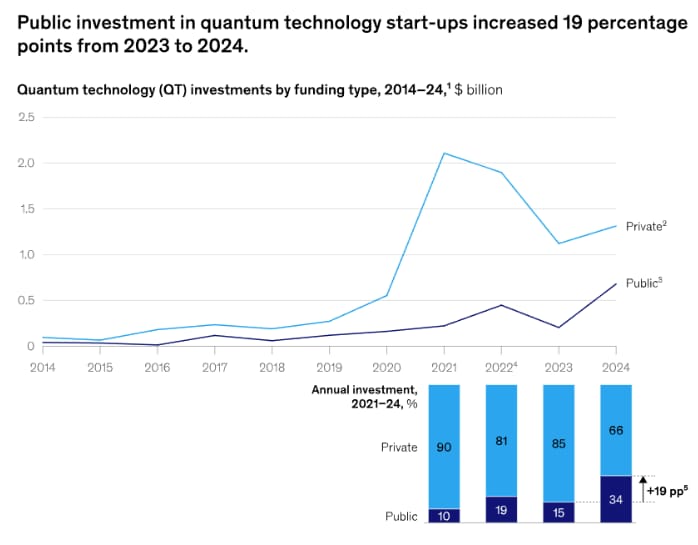Why Big Tech Is Betting on Quantum—And You Still Can
Quantum computing is scaling fast, with billions flowing in from private investors and tech giants. This report spotlights three public companies already tied to the buildout...

Electric vehicle makers are searching for better battery materials that improve range and reduce charging time. Logistics companies want faster, more accurate ways to optimize delivery networks. Financial institutions are looking for tools that can process millions of interrelated variables to improve portfolio performance. These problems are resource-intensive and computationally complex.
Quantum systems are being developed to address that complexity through a fundamentally different architecture – and they are achieving unthinkable results.

How does this all work?
Every computer today is built around bits. A bit holds a single value, either a zero or a one. That’s all it can ever be. Every photo, app, or spreadsheet is created by arranging long strings of these bits.
Quantum computers are different because their building blocks are qubits. A qubit can hold more than one value at once. It can behave like a zero, a one, or a mix of both. This ability comes from quantum physics, and it allows qubits to explore many possibilities at the same time. The effect multiplies when qubits are linked together in a system.
That structure makes quantum computers useful for problems that involve many variables and many potential outcomes. Instead of trying each option one at a time, a quantum system can evaluate many options together. This helps researchers model new materials, simulate supply chains, or test thousands of investment combinations more efficiently. These are real-world problems with serious commercial value.
The quantum computing market is expected to generate between $28 billion and $72 billion in annual revenue by 2035. Industry use cases are emerging across chemicals, financial modeling, drug discovery, logistics, and mobility. More than $1 billion in revenue is expected this year alone, as hardware deployments and application-layer software begin to scale.
Major private players are taking note. Nearly $2 billion in funding flowed to quantum startups last year.

Equipment, software, and platform providers are actively partnering with defense clients, cloud operators, and industrial firms. Governments are ramping up investment as well, with more than $10 billion in new quantum spending already announced this year.
Retail investors still aren’t paying full attention. But they should be.
Stocks tied to quantum adoption remain lightly covered and lightly traded. Rigetti (RGTI), one of the few full-stack quantum pure plays, trades below $150 million in market cap with thin institutional coverage. Stocks which sell critical infrastructure used in quantum environments still appear on almost no retail radar.
These companies are largely absent from popular ETFs. Quantum-adjacent names don’t appear meaningfully in ARKK, QQQ, or other tech-heavy retail portfolios. Most AI- and chip-themed ETFs are still centered on megacaps like Nvidia and AMD. Quantum remains overlooked.
Google Trends and Reddit suggest mainstream interest has yet to peak (though it is rising). Search interest in “quantum computing” is minimal compared to terms like “Nvidia stock,” “Bitcoin,” or “AI.” Retail attention has surged into the obvious plays, but has yet to rotate into quantum.
Even as capital flows in, headlines stay buried. Nearly $2 billion was raised by quantum startups last year, with an additional $10 billion in public-sector investment already announced in 2025. These figures exceed early-stage AI investment levels from 2016–2017. Yet very few investors are tracking this shift.
Big Tech is already placing major bets. Amazon’s Braket platform offers on-demand quantum computing access, Microsoft Azure Quantum is expanding enterprise trials, and Google is scaling error-corrected quantum chips. These investments are backed by dedicated research teams and billions in long-term infrastructure planning.
Quantum is following a familiar pattern. Enterprise adoption is building, capital is flowing in, and early-stage winners are beginning to separate from the pack. But while Google and Microsoft draw the headlines, the public market opportunity lies further down the chain. That’s where we’re focused.
This month’s MegaTrends report dives into the tremendous commercial opportunity behind quantum.
We’re tracking 3 stocks positioned to benefit: 2 hardware pin-action names and one full-stack quantum player already delivering systems to national labs.
This report will be delivered very soon!
Or, reply to this email and we will get you connected.